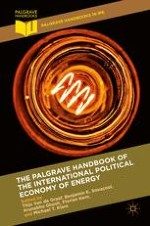2016 | OriginalPaper | Chapter
2. Actors, Institutions and Frames in Global Energy Politics
Authors : Thijs Van de Graaf, Fariborz Zelli
Published in: The Palgrave Handbook of the International Political Economy of Energy
Publisher: Palgrave Macmillan UK
Activate our intelligent search to find suitable subject content or patents.
Select sections of text to find matching patents with Artificial Intelligence. powered by
Select sections of text to find additional relevant content using AI-assisted search. powered by
